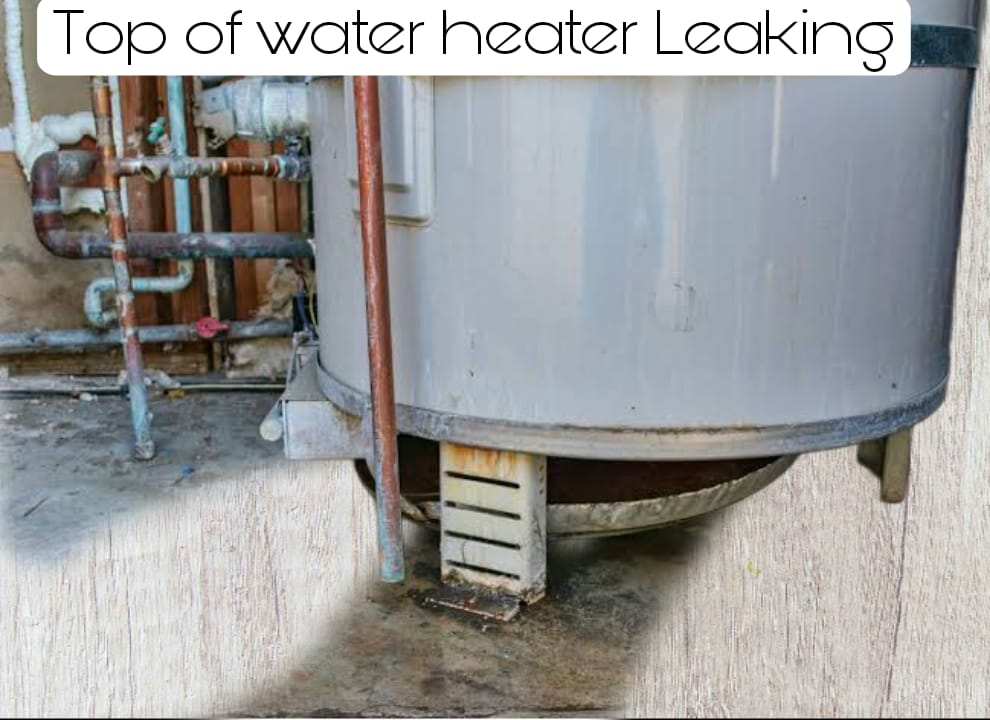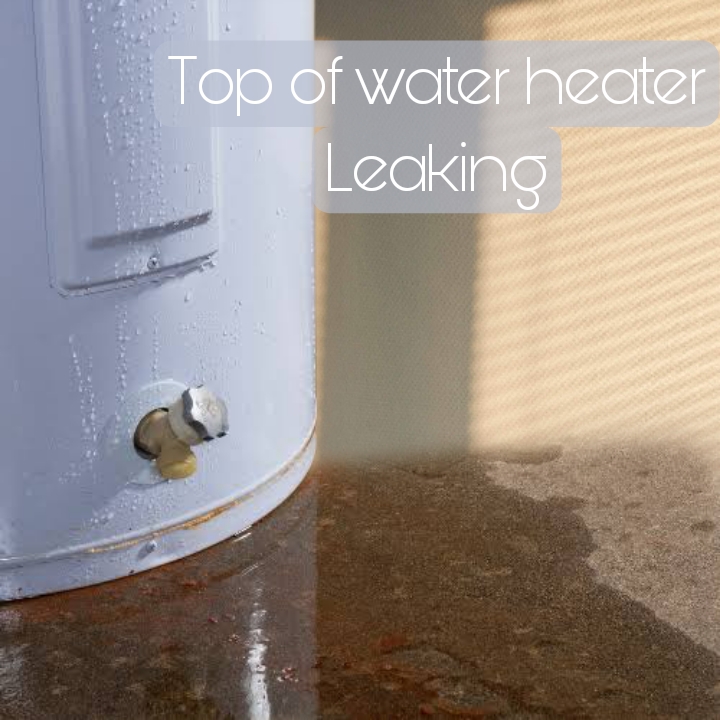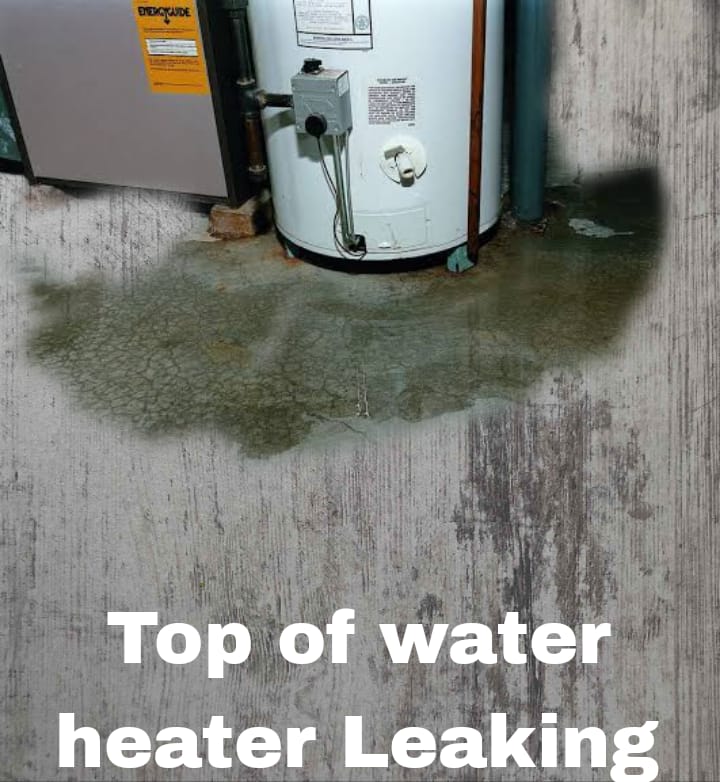The optimal situation for a leaky water heater originates from the top. More often than not, a leakage that originates from the top of a heat exchanger may be fixed if it is discovered in advance. Moreover, when the Top Of Water Heater Leaking or water runs around the outside of the hot water system, if the leak is not repaired as soon as possible, it might cause significant and expensive damage. Water may enter the container holding the circuit boards of a water heater dripping from the top, leading to an electrical malfunction if the leak is not fixed. Another issue that could arise is standing water on your water heater’s outer walls or flooring. It’s essential to act quickly if you think your water tank is leaking. You’ll learn more recent specifics about water heater leakage issues and how to avoid them.
Discovering a water heater leaking can be a frustrating and potentially damaging experience for homeowners. Several factors could contribute to this issue, including corrosion of the tank due to age or sediment buildup, loose fittings or connections, excessive pressure within the tank, or a faulty temperature and pressure relief valve. In some cases, leaks may also occur due to cracks or damage to the tank itself. Prompt action is crucial to prevent water damage to surrounding structures and appliances. Homeowners should first shut off the water supply to the heater and electricity or gas source to prevent further leakage and potential hazards. Next, they can inspect the source of the leak and address any visible issues such as tightening loose fittings or replacing damaged components.
How Do Hot Water Heaters Operate?
Before anything else, you must recognize how your hot water system functions. The entrance pipelines are used to introduce cold water into the tank initially. The cold water is then slowly lowered by a dipping pipe to the tank’s bottom, where it is warmed. Two or more electrical circuits of an electric stove heat water throughout because of being located close to the top and bottom, respectively.
The burning component ignites a spark using a gas hot water system. The freshwater in your holding tank is then warmed due to the flame’s consequent heating of the tank’s bottom. Finally, a silvery circular pipeline allows the burning gas’s emissions out. This pipeline heats the water as well as releases the combustion products. The outflow pipe is how this water eventually leaves the heater and is distributed around your house.
How Do You Fix A Top Of Water Heater Leaking?

Despite their lengthy lifespan, even the largest Top Of Water Heater Leaking occasionally malfunction. Even while a malfunctioning water heater does not mean it automatically ought to be replaced, defects should be fixed as soon as they are detected. It’s crucial to evaluate the issue immediately because even the slightest bit of water can lead to significant damage. First, determine the source of the leak. Water heater leaks may not originate from the water heater itself, even if there is some water inside. Analyze the surroundings after cleaning the water.
Look about you for any additional freshwater resources that could be there. Is the water located close to a drain pipe or a doorway? If the flooring dips in any way, water can have come from somewhere else and ended up wherever you observed it because of gravitation. Cast aside some toilet paper where the water was located and come back within a few minutes to an hour or three if you cannot identify the reason right away. If the clothes are damp when you return, there is a problem, and the hot water tank may be to blame.
When The Water Heater Leaks, Is It Still Possible To Use The Water?
If your water heater leaks, you can still utilize the water. Leaking raises some anxiety. Finding the leak’s precise position and the extent of its dissemination to your home and other property is challenging because it could cause more damage or harm. To prevent the water heater from breaking down before a plumber finally arrives, one should strive to use as little water as possible. You may continue to be capable to utilize the equipment after preventing the flow of water out of a leakage, based on where your portable hot water system cracks or overflows. If your gas equipment leaks gases like carbon monoxide, cut off the gas pipeline and leave the windows and the doors open for a while to let the interior air out first before putting on the electrical items once more.
Causes Of Top Of Water Heater Leaking

Unsecure Connections
Examine all water input and exit connections thoroughly. Water frequently leaks there, and you can easily catch them where the connections attach to the water heater. You can strive to adjust the fittings using a screwdriver. Your issue might be resolved by entirely stopping the leak using this. Additionally, rusting is frequent in this location. The best way to combat rusting is to replace the fittings. Assuming your fittings are made of metal, in which case joining them with soldering is nearly always the job of a qualified engineer, this is likewise a simple process.
Defective T&P Drainage Outlet
A T&P faucet is an essential component that controls pressure within a heater to prevent an explosion. Depending on the model, T&P valves can be put on the top or the side of a heater. The T&P valve experiences wear and tear since it constantly adjusts pressure and temperature. It’s common for the opening to release under excessive pressure. T&P valves may also leak near their factor in the continuing. The interconnection could eventually deteriorate and leak from the side or top of the water heater. As long as the connection speed stitching is solid and capable of creating a tight seal, the TPR valve can often be replaced.
Tank with Cracks
If the water is dripping first from the side or bottom of the tank, it may have a crack in it. So because the internal tank liner contaminates over time; this typically occurs with outdated water heaters. Additionally, excessive debris might accumulate in the tank’s bottom, accelerating rusting and resulting in cracks. Alternately, a tank with consistently high-pressure inside might develop stress fractures, which ultimately cause leakage.
Sedimentary Material Compilation
Due to some reasons why maintaining your water heater regularly is crucial. If you don’t clean the bottom of the tank, sediment accumulates and can cause the tank to crack over time. A hot water system leak in your home can range from mild to severe, from minor to serious, if cracks emerge in the tank. All you can do if the tank begins to leak is replace it. Do yourself a favor and clear the tanks a few times yearly to avoid this. Later, your wallet will appreciate it.
Unstable Storage Tank With Cracks
Third, glass tanks, popular in some heating systems, can accumulate minerals. These minerals become harder with time, generating glass fissures that let water flow through. Once again, the only way to solve the problem is to replace the glass tank completely.
Other Causes:
- An untightened pipe connection.
- The drain valve is open or worn out.
- The tank pressure is high.
- Gaskets that are damaged.
Does A Damaged Water Heater Last For Long After It Starts Leaking?
Your dripping water heater’s longevity depends on a variety of factors, including the location of the leak. The typical lifespan of a water heater is 12 to 15 years. It’s not necessarily the end for your water heater if yours is dripping. If you receive prompt, accurate evaluation and repair, your water heater may last the time intended for it. Depending on the cause of the leakage, you may only have a minor problem that has to be resolved. You can have a leaky drainage piston lock or a poor electrical connection at your drip pan connections. You will need to perform simple repairs, like adjusting pipes, for problems like these. It won’t take long to get your water heater working again. These water heaters will probably last the entire time they were designed to.
How to Repair A Leaky Water Heater?
You can select to repair your dripping water heater manually if it seems to be a minor issue and you have previous expertise handling plumbing and heating repairs. It is, however, more comfortable for most people to hire a professional to repair their heater. Your comfort and the difficulty of the repairs will largely determine your choice.
- Repairs of Hot and Cold Water Outlets
By using a dowel rod to adjust the fittings, you might be able to stop any leak that is coming out from the water heater’s cold or warm inlet pipe or exit. Replacement of the foldable pipes that deliver cold water is necessary if fixing the connections does not stop the leak.
- Holes Within The Tank
A significant internal issue could be present if your water tank is dripping out from the bottom of the tank. Always try to remove your water heater to repair and replace the inside. There is only really one practical solution if your inner tank is overflowing. The water heater must be changed. Internal tank leaks cannot be fixed; they will continue to worsen. If the water heater leakage isn’t too significant, though, and it’s situated in a basement or a garage, you might be able to buy some time by just keeping an eye on it.
How to Fix A Water Heater Leak?
Defective valves, insufficient tank pressures, or difficulties with the pipelines that attach to the unit are a few of the difficulties that might cause a water heater to leak. Additionally, when your water heater is older than ten years, the leak is probably due to deterioration; in that case, it may be necessary to fix it. Accordingly, there may be a straightforward, simple repair even if you still have to contact a professional, based on where the leak is. Before identifying the leak and fixing the issue, a few procedures need to be taken immediately.
- The leaky water heater’s electricity should be turned off.
- Shut down the water pressure going to the tank next.
- Investigate to discover the leakage in the water heater.
- Lock down any slack piping connections.
- Check the flow of cold water’s pressure.
- Changing a leaking flow control valve.
- If the problem is in the tank’s bottom, get a new water heater.
Costs Of Fixing
Water heater maintenance costs typically range from $1300 to $5500, with an average of $1700. The specific component that needs repair will determine the cost of your water heater maintenance project, among the most critical factors. Water heater repairs typically cost $506 on average.
Is It Possible To Prevent Water Heater Leaks At The Top?
Regular preventive inspection and maintenance of the water heater are crucial. You may prevent expensive fixes and water leaks in the long term by doing essential maintenance on your home’s water heater to help prevent malfunctions and leaks. You can also put a leak sensor on the floor close to the water heater to help you be informed as soon as a leak appears. These gadgets emit loud noises, and some may even connect to your home’s web to send notifications if a leak develops.
Conclusion
Without a doubt, you want to continue taking hot showers. The difference between spending a few dollars on replacement valves and thousands of dollars on a new boiler depends greatly on routine maintenance. Ensure every fitting is installed correctly and free from corrosion and sediment to prevent the Top Of Water Heater Leaking.
Apart from this, if you are interested to know more about Plumbing Problems and How To Fix it then visit our HOME IMPROVEMENT category.
FAQs
If replacing an item exceeds 50% of the repair cost, you should choose to replace it instead of repairing it. Therefore, you should consider the regularity of fixes and the duration of your water heater, although your existing fix does not equal 50% of a replacement water heater.
One of the most typical reasons for a heater malfunction is sand accumulation, corrosion, and high water pressure. Other frequently encountered problems include poor construction or device size. Blank walls or carpeting may be harmed by a leak that develops close to the main pipe.
Assuming that new electricity and water lines must be installed, the setup is more labor-intensive, which increases the cost. Electric cabling needs to be updated to accommodate modern water heaters.
